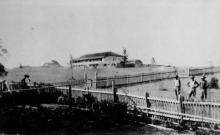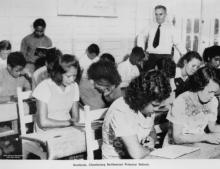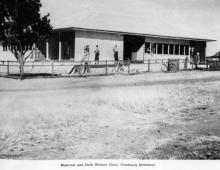Cherbourg
T Blake, A Dumping Ground: History of the Cherbourg Settlement: https://penguin.com.au/books/a-dumping-ground-the-history-of-cherbourg-settlement-1900-1940-9780702… ;
Mok, Cherbourg Dorm Girls: https://books.google.com.au/books/about/Cherbourg_Dorm_Girls.html?id=y0PxPAAACAAJ&redir_esc=y
Cherbourg Memory: http://cherbourgmemory.org/
-26.291946, 151.953860Aboriginal and Torres Strait Islander families from all over Queensland and the Northern Territory were forcibly taken to Cherbourg. The government acknowledged the effectiveness of using dormitory systems in controlling the lives of children, and the first dormitory for girls at Cherbourg was opened in 1909, and for young boys in 1910. Life for young people at Cherbourg was strictly controlled: they were segregated from other residents, given very little personal freedom, and their behaviour was regulated with strict discipline. Having achieved self-governing status in 1986, Cherbourg is among the many reserves with a significant historical record of personal testimonies .
0Established in 1900 by the Salvation Army as an Aboriginal mission, became a self-governing community in 1986.
Cherbourg DormitoryGovernment of Queensland, Cherbourg (8 April 2015) Aboriginal and Torres Strait Islander community histories https://www.qld.gov.au/atsi/cultural-awareness-heritage-arts/community-histories-cherbourg/
QldWurundjeri Council
http://wurundjeri.com.au
City of Yarra, Wurundjeri History of Yarra - Introduction, City of Yarra
http://aboriginalhistoryofyarra.com.au/1-introduction/
My mother and brother could speak our language and my father could speak his. I can't speak my language. Aboriginal people weren't allowed to speak their language while white people were around. They had to go out into the bush or talk their lingoes on their own. Aboriginal customs like initiation were not allowed. We could not leave Cherbourg to go to Aboriginal traditional festivals. We could have a corroboree if the Protector issued a permit. It was completely up to him. I never had a chance to learn about my traditional and customary way of life when I was on the reserves (p. 133).
When I was thirteen I started contract work. I did not ask to go to work. The white officials just told us we had to go to work and they wrote out a contract for us. My first job was on L. Station, Winton. I was employed to do housework but I had to do everything. Looking after Mrs E's invalid mother - including bathing her and taking her to the toilet. I did washing, ironing, house cleaning, cooked and served meals, looked after the yard, chopped wood, milked cows, did bore casing, rod placement, water pumping and did fencing with Mr E. I had to eat my meals from a tin plate and drank from a tin mug, I ate my meals on the wood heap. I was given different food to what the E's ate. Sometimes I was just allowed a couple of eggs - I was often very hungry. I had a room at the end of the shearer's shed (the shed could accommodate up to 24 shearers, during shearing time). It was small, windowless and there was no lighting. I had a wogga for a bed - made out of hessian [stuffed with straw], a bag for cover and a potato bag for a cupboard. I was very nervous there especially coming from the dormitory life where we were either guarded or locked up. I was thirteen at the time Mr E wanted to rape me. I rushed around to his car pulled out the shotgun and instead of shooting him I pushed him in the bore tank. He never tried anything else since. I told Mrs E and she told me that it was a lie, that he wouldn't touch a black person. I told the Superintendent at Cherbourg. He wouldn't believe me (p. 143)
I wanted to find out my right age and where all my family came from and who I was related to (p. 281).
There are a lot of stories in the files that have been written about me from when I was in different stations working ... And the bad things they said about me in the past from the settlement wasn't true. There are a lot of untrue things about me on the files. I have cried about the lies on those files. Things that are lies about me, things I was never told about, are on those files.
Confidential submission 110, Queensland: woman removed in the 1940s (p. 292).
Human Rights and Equal Opportunity Commission, Bringing them Home: National Inquiry into the Separation of Aboriginal and Torres Strait islander Children from Their Families (1997)
Unknown Confidential submission 110
Cherbourg Dormitory, 1933

Cherbourg Dormitory, 1952: Students at the settlement school

Cherbourg Dormitory, 1953: The settlement clinic
